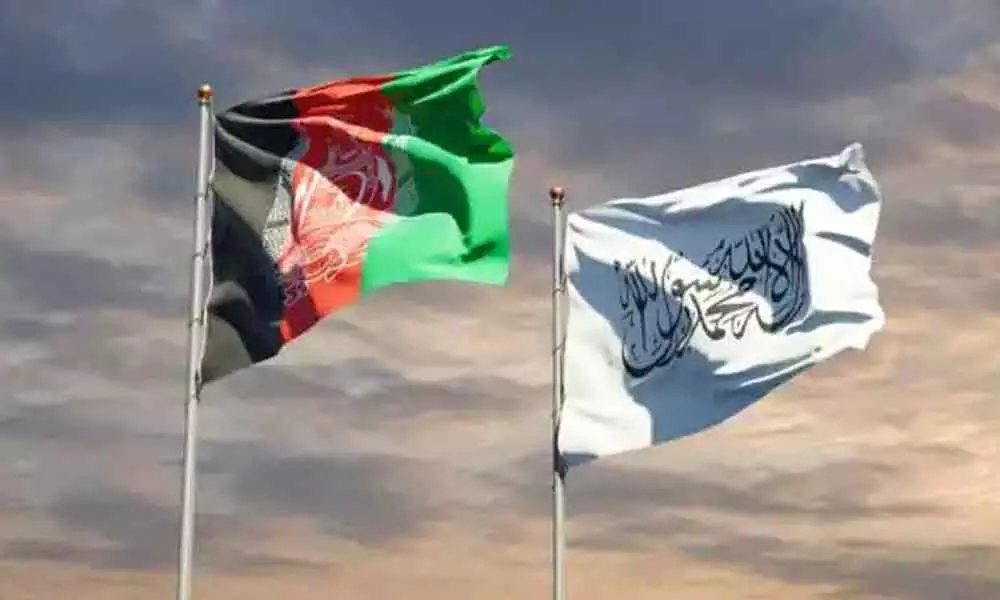It's Emirate vs Islamic Republic in Kabul

The return of Islamic Emirate in Kabul on August 15 this year, and what is happening in Afghanistan since then, must draw attention to December 1996 when with the full support of Pakistan, Taliban had first captured Kabul, established the Afghan Emirate under Mullah Omar and issued a five-point directive ordering strict enforcement of Islamic laws, creation of 'religious police,' women to stay at home, closure of all video and private media, and even led people to pray on the highways.
Mullah Omar was a close relative of Osama bin Laden, and Al Qaeda had a large base in Afghanistan. In the wake of 9/11, the US cracked down on Afghanistan overthrew the Taliban government and got an elected Loya Jirga – the rough equivalent of a Constituent Assembly – to establish a transitional setup under Hamid Karzai in 2001 to work for political freedom of Afghans based on Islam, democracy and social rights.
In the Presidential elections of 2004 and 2009, Hamid Karzai emerged victorious and in the subsequent polls in 2014 and 2019, Mohammad Ashraf Ghani was elected President of Afghanistan. But something was not working for the Afghan democracy and the principal reason was that the elections were not transparent – most of the members of Parliament were warlords and illiterate people who reached the House on the strength of their capacity to use violence and influence.
Clash of personal interests resulted in Abdullah Abdullah not accepting the victory of Ashraf Ghani in 2014 elections and in 2019 – when Ghani won again – forcing a sharing of power in the name of National Unity government. The unstable conflict-ridden government could not promote democratic norms, allowing the Taliban to have its way to power through recourse to militancy.
The big question in Afghanistan from the American viewpoint is whether the Taliban Emirate would be willing to climb down to become an Islamic Republic of the type that existed under Hamid Karzai and Ashraf Ghani, accommodating women in positions of political power and allowed functioning of independent media.
Although the US is facing a recalcitrant Taliban out to impose socio-religious restrictions of the Emirate, it is not taking adequate notice of Pakistan's collusion with the Taliban that was meant to provide 'strategic depth' to Pakistan in Afghanistan - primarily against India. Americans also do not see through the geopolitical strategy of Pakistan of building its larger image as the land that accommodated all shades of Islamic spectrum within Ummah. US President Joe Biden seems to be underestimating the strategic significance of Wahabis aligning with Marxist China – an upshot of Sino-Pak axis – on account of their shared ideological and political animosity towards the US-led West.
India is handling the totality of this situation quite well. The policy of building up military strength to deal with any Chinese aggressiveness on LAC and punish Pakistan for any further mischief from across LoC, is firmly in place. India has taken care to ensure that Indo-Russian relationship does not come in the way of India's strategic partnership with the US. Russia's relationship with China in the context of US-China antagonism is something that can be kept under observation by India.
Coming back to Afghanistan, the challenge there is to get the Taliban to yield to an inclusive set up including women and minorities and abandon the politics of violence.
Also, India is rightly leading the voice for economic and other civic assistance to the people of Afghanistan - India's development aid to Afghanistan had already made a deep impression on them and strengthened people-to-people friendship between the two countries.
The selective authorisation for humanitarian aid to Afghanistan by the US is a right step as it builds the case for a pro-people dispensation. The fact, however, remains that the conflict in Afghanistan is between the idea of an Emirate and an acceptable form of Islamic Republic - the latter promising to have some democratic content even if it did not put minorities on the same footing as the Muslims.
It is likely that the Taliban Emirate would not change its revivalist extremism and commitment to Jehad as an instrument of political advancement. India would have to watch out against the added threat of Islamic terror from the Pak-Afghan belt. In the new emerging geopolitics, India and the US – the two largest democracies – will have to jointly defend the democratic order against the global threat from the Marxist dictatorships and the world of radical Islam.
Prime Minister Narendra Modi has in a farsighted move actively joined Quad that counters China's aggressive designs in the Indo-Pacific on one hand and promotes convergence among leading democratic powers on global commons on the other.
(The writer is a former Director of Intelligence Bureau)














